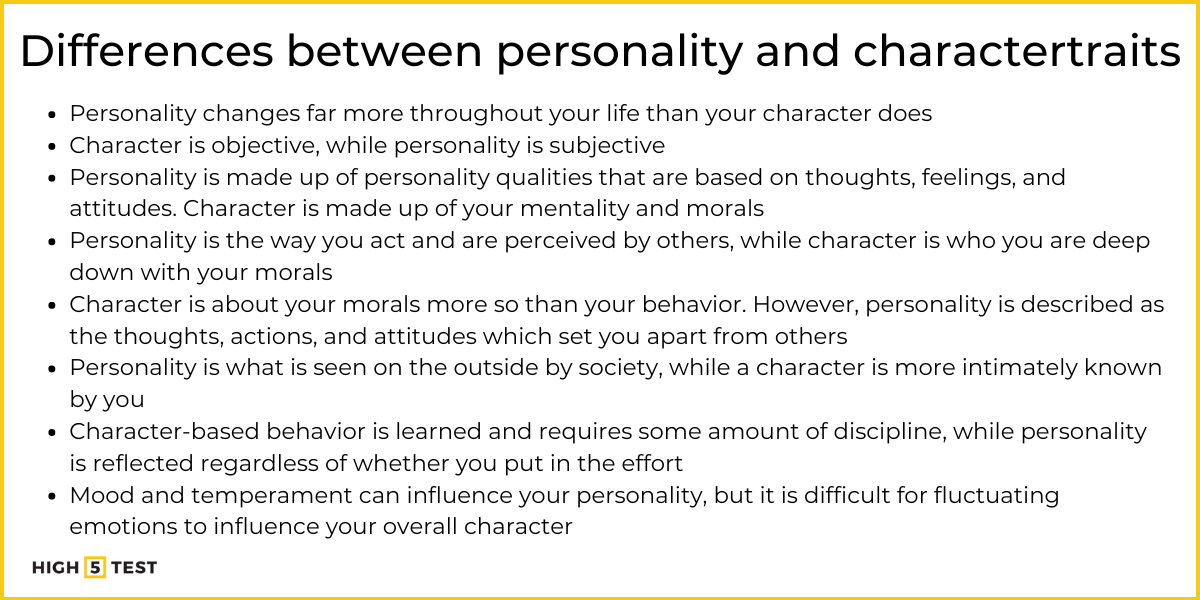Although many people use these two terms interchangeably, there are many key differences between your character and personality. They both play a major role in our identity and can influence the way we think, our behavior and our actions [1]. By understanding the key differences between these concepts, you can develop both your character and overall personality to be more closely aligned with your goals and aspirations in order to feel authentic and fulfilled. Unfortunately, too many individuals overlook the differences between character and personality, leading to confusion and a lack of growth. There can be additional negative impacts on your career and home life, too. Luckily, the difference is easy to understand. In this article, we will discuss the difference between character and personality as well as how they both influence aspects of your life.
Understanding the nuances between character and personality is crucial for personal growth, but it can be challenging to navigate alone. This is where the HIGH5 strengths test becomes an invaluable tool. By helping individuals and organizations identify and leverage their natural talents, HIGH5 provides a solid foundation for enhancing both character and personality. The test offers unique insights into your inherent strengths, allowing you to develop a more nuanced understanding of yourself. This self-awareness is the first step towards intentional growth in both your character and personality, leading to increased satisfaction, engagement, and effectiveness in both personal and professional spheres.
What is personality and what is character?
Definition of personality
Personality is made up of numerous cognitive elements, including how you think or feel and it can influence how you interact with others, and how you respond to certain situations. Personality is typically thought to be stable and consistent over time and research indicates that it is something that is influenced by both your environment and genetics [2]. Your personality is influenced by your temperament, which is something that is generally fixed from birth. Temperament is also referred to as “disposition” and it is what makes us adopt certain ways of reacting to the world around us. It includes things like our energy levels, adaptability, flexibility, inhibition, ability to regulate and respond to emotions, curiosity, and mood [3].
Definition of character
Character traits refer to the ethical and moral values we hold and how these beliefs influence how we act. It is about the principles that we live our life by and then how we interact with people and the world around us based on those values Your character is thought to be shaped by your experiences, belief system, and upbringing and with concerted effort it can be addressed or shifted in some way [4].
Key differences between personality and character
Now that we have explored what personality and character are, you should be able to separate and understand the key differences between these terms. Doing so will give you additional clarity and allow you to better see how these terms influence your life. In essence, you are born with a certain temperament, which influences your personality and your character develops over time. Your personality describes what you are like, but your character describes who you are.
Here are a few of the key differences between personality and character [1,4]:
- Character is objective, while personality is subjective
- Personality is derived from qualities that are based on thoughts, feelings, and attitudes. Character is made up of your values and morals
- Personality is the way you act and are perceived by others, while character is who you are deep down at your core
- Personality is reflected in your behavior and more likely to be seen on the outside society, while a character is more about internal processes and things that drive you, which may not be visible or clear to outsiders
- Personality is primarily shaped by your genetics and environmental factors and it emerges in early life, while your character is formed through your upbringing, life experiences and even the choices you make
- Character can be shifted or strengthened over time and with concerted effort, but personality tends to be more stable or less changeable

Examples of differences between character and personality
Honesty vs. charm
Character encompasses deep-seated qualities demonstrated through our actions under moral or ethical challenges; honesty is a prime example of such a trait [4]. It’s about being truthful and transparent in various situations, reflecting a person’s ethical principles. Contrastingly, personality includes surface-level characteristics that dictate how others perceive us in social settings [1]. Charm is an aspect of personality that showcases one’s ability to attract or influence others through charisma without necessarily revealing the deeper ethical or moral standings.
Integrity vs. sociability
Integrity, another core element of character, involves adhering to moral and ethical principles regardless of the situation or presence of others. It’s about consistency in thought and action when faced with ethical dilemmas. On the flip side, sociability falls under the personality umbrella, reflecting how comfortable and engaging an individual is in social gatherings. Unlike integrity, sociability is more about one’s outward behavior and less about one’s inner moral compass. Understanding the distinction between character and personality is crucial in recognizing how they influence our interactions and growth. Identifying and developing both aspects can lead to a well-rounded and fulfilling life.
Why is it important to recognize your own personality and character traits?
Both personality and character undoubtedly play major roles in an individual’s life. They influence the way that person thinks, how they act, what they believe, how well they achieve goals, and so many other key areas of one’s life. As such, it is important to recognize your personality and character traits. There are many benefits that come along with this recognition. Recognizing your personality and character traits is a crucial step in self-reflection and personal growth. The HIGH5 strengths test offers a structured approach to this self-discovery process, helping you identify not just potential areas for improvement, but also your innate strengths. By understanding your unique strengths profile, you gain insights into both your character and personality. This awareness allows you to leverage your strengths to address challenges, build positive traits, and enhance your overall personal and professional effectiveness.
The HIGH5 test goes beyond merely pointing out flaws; it empowers you with a strengths-based perspective, enabling you to approach personal development from a position of confidence and self-awareness. Your relationships with others can also positively change if you start recognizing and improving your personality and character traits. Personality is often interpreted immediately by those you meet, and first impressions mean a lot in today’s both corporate and intimate world. As such, if you learn your personality weaknesses and improve on them, you can begin to form better connections. This could lead to better personal relationships, clearer communication, more collaboration at work, and so on.
Pro Tip From HIGH5
Use your HIGH5 strengths as a lens for self-reflection. If ‘Empathizer’ is one of your top strengths, consider how it influences both your personality (how you interact with others) and your character (your moral stance on compassion and understanding).
How to improve and develop good personality and character traits?
As previously mentioned, good personality and character traits are crucial to your emotional well-being, career development, relationship strengthening, and many other parts of your life. However, many individuals struggle with taking the next step. They wonder: now that I know my personality and character traits, what should I do? The next step that you should take is organizing yourself and making a plan. To improve and develop positive personality and character traits, start by gaining a comprehensive understanding of your strengths. The HIGH5 strengths test provides an excellent foundation for this, offering a detailed analysis of your top five strengths. Once you have your results, reflect on how these strengths manifest in your daily life. How have they influenced your career or relationships? Identify patterns where these strengths have led to success or positive outcomes.
The HIGH5 test not only helps you recognize your strengths but also provides insights on how to apply them effectively across various aspects of your life. This strengths-based approach allows you to build on your natural talents, fostering authentic personal growth and character development. Then, you can apply these traits to other parts of your life. For example, if you notice your discipline and organization led to success multiple times in the past, you can apply them to current challenges. While you should not dwell on your weaknesses, it is still important to be aware of them. Do not let your weaknesses bring you down or make you feel weak. Instead, view them as a growth opportunity. Find ways to use one of your weak skills in combination with your strengths. Suppose you struggle with discipline but are very creative you might develop a plan that compliments both aspects of your personality or character. You could set a goal to create one piece of artwork daily, with no excuses.
This way, you will be practicing discipline with something more enjoyable, but still ensuring you do not give excuses. To support your struggles with discipline it is important that the task is firstly something enjoyable, but secondly set yourself up for success by setting mini goals or progress goals to help you feel some success as you work through your project, or make sure that you set a clear outline of what each step will be so you can stick to your plan. In addition, you should also seek some outside help. It is always great to have a supportive group of people around you. Your friends or coworkers can give you feedback on how well your personality and character growth plan is working. Ensure that you trust them and encourage them to give you honest feedback. In fact, you could even ask your boss for some input as well.
If you want to improve your personality or character traits that are tied to productivity (like hard work, organization, and persistence, among others) you can ask for your productivity metrics. Notice how well you interact with your team members. See if you are building relationships and if people are generally responding to you in more positive ways. Check if you are producing more sales, creating more ads, and so on to evaluate your productivity. Try to keep track of the times when you let negative personality or character traits overpower your positive side. Write down whenever you do something unproductive at work if you fail to meet a goal or deadline, and if you fail to stay organized. This will ensure you stay honest with yourself. After these events occur, ask yourself what you did wrong to end up missing your goal or whether your challenges were influenced some some of your weaknesses.. Create a plan for avoiding this next time.
Pro Tip From HIGH5
Align your personal development goals with your HIGH5 strengths. If ‘Deliverer’ is one of your top strengths, set specific, measurable goals for character development, such as practicing patience or honesty, and track your progress regularly.
How your character traits and personality are perceived by others
How others perceive a person’s character and personality can often be skewed by their own experiences, values and beliefs. Character traits like honesty, integrity, and deep-seated qualities may not always be immediately visible to others and typically require time and consistent actions to be recognized and appreciated. Conversely, personality traits, such as charm and sociability, are readily observable and often form the basis of first impressions. This discrepancy can lead to misunderstandings or underappreciation of someone’s true character is heavily weighted by first impressions. While individuals often have a nuanced understanding of their own character and personality, there can be an even bigger disconnect between self-perception and how others perceive us. The HIGH5 strengths test bridges this gap by providing an objective assessment of your strengths, which often manifest as key aspects of your character and personality.
By understanding your strengths through the lens of the HIGH5 test, you gain valuable insights into how others might perceive you. This awareness allows you to more effectively communicate your values and strengths to others, ensuring that your character traits, such as honesty and integrity, are not only internally recognized but also externally visible. The HIGH5 test thus becomes a powerful tool for aligning your self-perception with others’ perceptions, fostering more authentic relationships and interactions. On the other hand, personality traits such as charm and sociability might be seen as tools or roles that one adopts in various social contexts, which might not always align with how one views oneself at a deeper level.
This internal perspective allows for a more comprehensive self-awareness but can also lead to frustration, or a sense of misalignment when others’ perceptions don’t match one’s self-understanding. Bridging the gap between how others perceive us and how we understand ourselves is an ongoing challenge involving introspection, active efforts to make changes and improving communication (to help us share inner qualities that are less visible or overt). It requires an openness to feedback and the courage to express oneself in diverse settings. For many, this means finding opportunities to demonstrate character through actions, thereby allowing others to see the values underlying the more immediately visible personality traits. Likewise, it involves looking beyond the surface in others, fostering deeper connections that respect character and personality.
Pro Tip From HIGH5
Use your HIGH5 strengths to bridge the gap between self-perception and others’ perceptions. If ‘Storyteller’ is one of your top strengths, consciously use it to articulate your values and principles clearly to others, ensuring your character traits are accurately perceived.
Character vs. personality FAQ
Which is more important personality or character?
Both personality and character are crucially important to your relationships, career success, and emotional well-being [1]. It is difficult to say that one is more important than the other because they are two different things, but each can influence the other. Personality may be more important when making initial impressions. However, your character is made up of your morals, which is extremely important to the way you see the world and make decisions. In the long term (within the context of relationships or other long-term endeavors), character may be seen as slightly more important.
What is the difference between character and personality ethics?
Our ethics are essentially the values and principles that help guide our behaviors and choices and it helps us decide wrong from right. Personality and character ethics represent two ways to approach personal development and success, particularly when it comes to how people view behavior, values, and integrity. If we think about our character, ethics emphasizes the foundation for a good and happy life is to be in alignment with our morals, virtues and values. Whereas ethics associated with our personality emphasize our outer behaviors, choices and social interactions as ways of being successful [5]. In summary, your character is who you are on the inside and your personality is how you present to the outside world.
What defines a good personality?
A good personality is subjective. What one may consider moral and good could be different from another’s judgment. In general, though, a good personality is defined as having admirable and positive personal qualities. These personal qualities could include honesty, discipline, organization, hard work, friendliness, being open-minded, dependability, leadership, empathy, conscientiousness, responsibility, courage, and many others. All of these traits allow you to form better bonds with others, as they will immediately get a good impression of someone with integrity.
What determines someone’s character?
Character is made up of one’s moral judgments, which are in part defined by how you act, feel, and think, and the attitudes you display [4]. Your morals are determined by several different factors. For instance, your family background, experiences through life, relationships, and other factors all influence how you structure your morals. In the end, the character of an individual is determined not only by their moral beliefs but how they act in accordance with these beliefs…or not.
What is the difference between personality and personality type?
Personality is the unique combination of characteristics, traits, and behaviors that make up an individual’s identity and influence how they perceive and interact with the world. On the other hand, personality type refers to a categorization or classification of personalities based on specific traits or characteristics [2].
What is the difference between character and characteristics?
Character refers to a person’s moral or ethical values, principles, and beliefs that guide their thoughts and actions. It is often seen as the “core” of a person’s identity.
Are you born with character or personality?
While some aspects of our personality and character may be influenced by genetics or early childhood experiences, both are primarily shaped and developed through life experiences, interactions, and self-reflection. This means that while we may have certain predispositions towards certain traits or behaviors, our character and personality are not set in stone and can evolve. However, it’s more likely that personality is fixed as it is driven by our temperament which is relatively stable over our lifetime, and character can be changed with effort over time.
References:
- Dametto, D. M., & Noronha, A. P. P. (2021). Study between personality traits and character strengths in adolescents. Current Psychology: A Journal for Diverse Perspectives on Diverse Psychological Issues, 40(5), 2067–2072. https://doi.org/10.1007/s12144-019-0146-2.
- Corr, P. J., & Matthews, G. (Eds.). (2009). The Cambridge handbook of personality psychology. Cambridge University Press. https://doi.org/10.1017/CBO9780511596544.
- (nd). (2018). Personality: Where does it come from and how does it work?. APA. https://www.apa.org/pubs/highlights/spotlight/issue-111.
- Power, F. C., & Khmelkov, V. T. Character development and self-esteem: Psychological foundations and educational implications. International Journal of Educational Research. 1998;27(7):539-551. https://doi.org/10.1016/S0883-0355(97)00053-0.
- Anwar, Sadia & Shah, Dr. Naimatullah. (2022). IMPACT OF PERSONALITY TRAITS ON ETHICAL BEHAVIOR. 6. 95-114. TypeSet. (PDF) https://typeset.io/pdf/impact-of-personality-traits-on-ethical-behavior-1zmp8km5f6.pdf.







